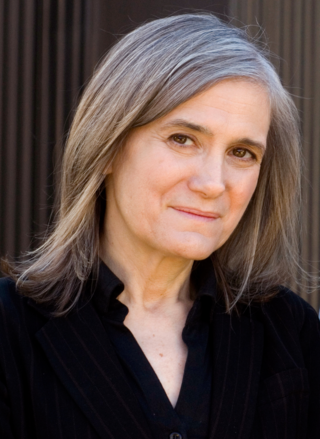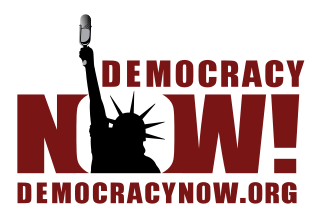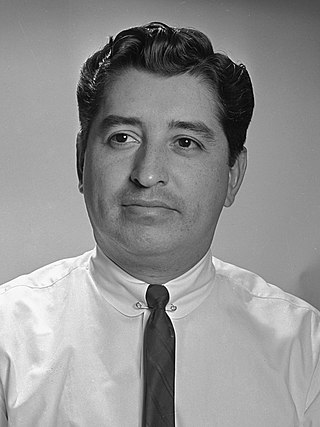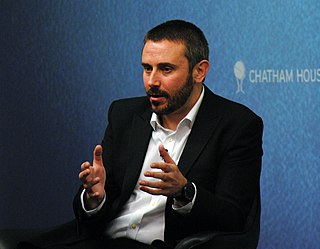Sergeant is a rank in use by the armed forces of many countries. It is also a police rank in some police services. The alternative spelling, serjeant, is used in The Rifles and other units that draw their heritage from the British light infantry. Its origin is the Latin serviens, 'one who serves', through the Old French term serjant.

Amy Goodman is an American broadcast journalist, syndicated columnist, investigative reporter, and author. Her investigative journalism career includes coverage of the East Timor independence movement, Morocco's occupation of Western Sahara, and Chevron Corporation's role in Nigeria.

Democracy Now! is a left-wing hour-long TV, radio, and Internet news program based in Manhattan and hosted by journalists Amy Goodman, Juan González, and Nermeen Shaikh. The show, which airs live each weekday at 8 a.m. Eastern Time, is broadcast on the Internet and via more than 1,400 radio and television stations worldwide.
The Movement for the Survival of the Ogoni People (MOSOP), is a social movement organization representing the indigenous Ogoni people of Rivers State, Nigeria. The Ogoni contend that Shell Petroleum Development Company (SPDC), along with other petroleum multinationals and the Nigerian government, have destroyed their environment, polluted their rivers, and provided no benefits in return for enormous oil revenues extracted from their lands.

Allan Nairn is an American investigative journalist. He was imprisoned by Indonesian military forces under United States-backed strongman Suharto while reporting in East Timor. His writings have focused on U.S. foreign policy in such countries as Haiti, Guatemala, Indonesia, and East Timor.

Juan González is an American progressive broadcast journalist and investigative reporter. He was also a columnist for the New York Daily News from 1987 to 2016. He frequently co-hosts the radio and television program Democracy Now! with Amy Goodman.

Ruben Salazar was a civil rights activist and a reporter for the Los Angeles Times, the first Mexican journalist from mainstream media to cover the Chicano community, in the US.

Nigeria is the second largest oil and gas producer in Africa. Crude oil from the Niger Delta basin comes in two types: light, and comparatively heavy – the lighter has around 36 of API gravity while the heavier has 20–25 of API gravity. Both types are paraffinic and low in sulphur. Nigeria's economy and budget have been largely supported from income and revenues generated from the petroleum industry since 1960. Statistics as at February 2021 shows that the Nigerian oil sector contributes to about 9% of the entire GDP of the nation. Nigeria is a major exporter of crude oil and petroleum products to the United States of America. In 2010, Nigeria exported over one million barrels per day to the United States, representing 9% of the U.S. total crude oil and petroleum products imports and over 40% of Nigeria exports.

The Movement for the Emancipation of the Niger Delta (MEND) is a decentralised militant group in the Niger Delta region of Nigeria. MEND's actions – including sabotage, theft, property destruction, guerrilla warfare, and kidnapping – are part of the broader conflict in the Niger Delta and reduced Nigeria's oil production by 33% between 2006-07.

The current conflict in the Niger Delta first arose in the early 1990s over tensions between foreign oil corporations and a number of the Niger Delta's minority ethnic groups who feel they are being exploited, particularly the Ogoni and the Ijaw. Ethnic and political unrest continued throughout the 1990s despite the return to democracy and the election of the Obasanjo government in 1999. Struggle for oil wealth and environmental harm over its impacts has fueled violence between ethnic groups, causing the militarization of nearly the entire region by ethnic militia groups, Nigerian military and police forces, notably the Nigerian Mobile Police. The violence has contributed to Nigeria's ongoing energy supply crisis by discouraging foreign investment in new power generation plants in the region.
Clifford J. Levy is deputy publisher of two Times company publications, the Wirecutter and The Athletic. He is a two-time Pulitzer Prize winner and considered one of the main architects of the digital transformation of The New York Times.

Jeremy Scahill is an American investigative journalist, writer, a founding editor of the online news publication The Intercept, and author of Blackwater: The Rise of the World's Most Powerful Mercenary Army, which won the George Polk Book Award. His book Dirty Wars: The World Is a Battlefield was published by Nation Books on April 23, 2013. On June 8, 2013, the documentary film of the same name, produced, narrated and co-written by Scahill, was released. It premiered at the 2013 Sundance Film Festival.
Bowoto v. Chevron Corp. was a lawsuit against Chevron Nigeria Ltd., a subsidiary of Chevron USA, which went to trial in 2008 in the United States District Court for the Northern District of California. The plaintiffs, Nigerian citizens who had been injured during or who had survived human rights violations perpetrated by Nigerian military personnel, alleged that the Chevron subsidiary backed the military action and that the parent company thus should bear liability in US courts for the resultant fallout. The suit was decided on December 1, 2008, when nine jurors unanimously agreed Chevron was not liable for any of the numerous allegations. Judgment was entered the next day, officially exonerating Chevron.

The 2009 Peruvian political crisis resulted from the ongoing opposition to oil development in the Peruvian Amazon by local Indigenous peoples; they protested Petroperú and confronted the National Police. At the forefront of the movement to resist the development was Asociación Interétnica de Desarrollo de la Selva (AIDESEP), a coalition of indigenous community organizations in the region.

Laura Poitras is an American director and producer of documentary films.

Paul Lewis is head of investigations at The Guardian. He was previously the newspaper's Washington Correspondent, San Francisco Bureau Chief and Associate Editor and has won 12 awards, mostly for investigative reporting. He is the co-author of Undercover; The True Story of Britain's Secret Police.

Occupy Nigeria was a socio-political protest movement that began in Nigeria on Monday, 2 January 2012 in response to the fuel subsidy removal by the Federal Government of President Goodluck Jonathan on Sunday, 1 January 2012. Protests took place across the country, including in the cities of Kano, Surulere, Ojota, Abuja, Minna, and at the Nigerian High Commission in London. The protests have been characterised by civil disobedience, civil resistance, strike actions, demonstrations and online activism. The use of social media services such as Twitter and Facebook was a prominent feature of the protests. Post Occupy Nigeria and 2015, the Nigerian Government under the new president, Muhammadu Buhari have increased fuel prices from N87 to N145 with little resistant possibly due to the fact that Nigerians are beginning to realize that fuel subsidies are actually inimical to the country's growth rather than a mechanism towards helping the poor.
The 2012–2014 Romanian protests against shale gas were a series of protests in major Romanian cities against exploitation of shale gas through controversial method of hydraulic fracturing. The main causes of these protests were the pollution of groundwater and environment, but also the threat of generating earthquakes. The protesters claimed the resignation of Prime Minister Victor Ponta, because he suddenly changed his position on the project. Before the electoral campaign of 2012, he opposed shale drilling, but after he supported it with any risks, on the grounds that Romania's energy independence is a national project.
Richard Rowley is a documentary filmmaker. His films and TV shows have received three Emmy awards, an Oscar nomination, and other awards and nominations, as well as recognition at film festivals around the world.

Chevron Corporation has been one of the most widely-criticized companies in the world, mostly stemming from its activities and involving climate change. Chevron's most widely-known scandal involves Texaco's activities in the Lago Agrio oil field, which Chevron is deemed responsible for due to its acquisition of Texaco in 2001. Chevron has been most widely criticized for its handling of litigation against it filed by residents of the Lago Agrio region, which included what activists see as the "jailing" of Lago Agrio lawyer Steven Donziger.












